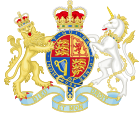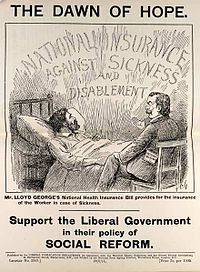- National Insurance Act 1911
-
National Insurance Act 1911 
Parliament of the United KingdomLong title ... Statute book chapter 1911 c Territorial extent England and Wales; Scotland; Northern Ireland Dates Royal Assent 1911 Status: Repealed The National Insurance Act 1911 is an Act of Parliament of the United Kingdom. The Act is often regarded as one of the foundations of modern social welfare in the United Kingdom and forms part of the wider social welfare reforms of the Liberal Government of 1906-1914. The increasing influence of the Labour Party among the population had put the Liberals under pressure to enact social legislation.
Contents
Background
Britain was not the first country to provide insured benefits. Germany had provided compulsory national insurance against sickness from 1884. After visiting Germany in 1908, the Chancellor of the Exchequer, David Lloyd George said in his 1909 Budget Speech, that the United Kingdom should aim to be "putting ourselves in this field on a level with Germany; We should not emulate them only in armaments." In 1908 David Lloyd George, the Chancellor of the Exchequer in the Liberal government led by Herbert Asquith proposed the 1911 National Insurance Act. This measure gave the British working classes the first contributory system of insurance against illness and unemployment.
Sections of the Conservative party opposed the Act considering that it was not for taxpayers to pay for such benefits. Some trade unions who operated their own insurance schemes and friendly societies were also opposed. The Act was important as it removed the need for unemployed workers, who were insured under the scheme, to rely on the stigmatised social welfare provisions of the Poor Law. This led to the end of the primacy of the Poor Law as a social welfare provider, resulting in the Poor Law finally being abolished in 1926.Key figures in the implementation of the Act included Robert Laurie Morant, and William Braithwaite.
Part I, Health
The National Insurance Act Part I provided for a National Insurance scheme with provision of medical benefits. Every worker who earned under £160/year had to insure themself by paying 4 pence, the employer paid 3 pence, and general taxation paid 2 pence (Lloyd George called it the ninepence for fourpence). As a result, workers could take sick leave and be paid 10 shillings/week for the first 13 weeks and 5 shillings/week for the next 13 weeks. Workers also gained access to free treatment for tuberculosis and the sick were eligible for treatment by a panel doctor.
Part II, Unemployment
National Insurance Act Part II provided for time-limited unemployment benefit. The scheme was to be based on actuarial principles and it was planned that it would be funded by a fixed amount each from workers, employers, and taxpayers. The scheme from Part II was restricted to particular industries, cyclical/seasonal industries like construction of ships, and neither made any provision for dependants. Part II worked in a similar way to Part I. The worker gave 2.5 pence/week when employed, the employer 2.5 pence, and the taxpayer 3 pence. After one week of unemployment, the worker would be eligible of receiving 7 shillings/week for up to 15 weeks in a year. The money would be collected from labour exchanges.
By 1913, 2.3 million were insured under the scheme for unemployment benefit and almost 15 million insured for sickness benefit.
A key assumption of the Act was an unemployment rate of 4.6%. At the time the Act was passed unemployment was at 3% and the fund was expected to quickly build a surplus. Under the Act, employees contributions to the scheme were to be compulsory and taken by the employer before the workers salary was paid.
See also
Notes
References
- I Gazeley, Poverty in Britain 1900-1945 (Palgrave 2003)
External links
United Kingdom legislation Pre-Parliamentary legislation Acts of Parliament by states preceding
the Kingdom of Great BritainActs of the Parliament of England to 1483 · 1485–1601 · 1603–1641 · Interregnum (1642–1660) · 1660–1699 · 1700–1706
Acts of the Parliament of Scotland
Acts of the Parliament of Ireland to 1700 · 1701–1800Acts of Parliament of the
Kingdom of Great Britain1707–1719 · 1720–1739 · 1740–1759 · 1760–1779 · 1780–1800
Acts of Parliament of the United Kingdom of
Great Britain and Ireland and the United
Kingdom of Great Britain and Northern IrelandChurch of England Measures Legislation of devolved institutions Acts of the Scottish Parliament
Acts and Measures of the Welsh Assembly
Acts of the Northern Ireland Assembly / of the Northern Ireland Parliament
Orders in Council for Northern IrelandSecondary legislation Categories:- United Kingdom Acts of Parliament 1911
- United Kingdom pensions and benefits
- 1911 in law
Wikimedia Foundation. 2010.


